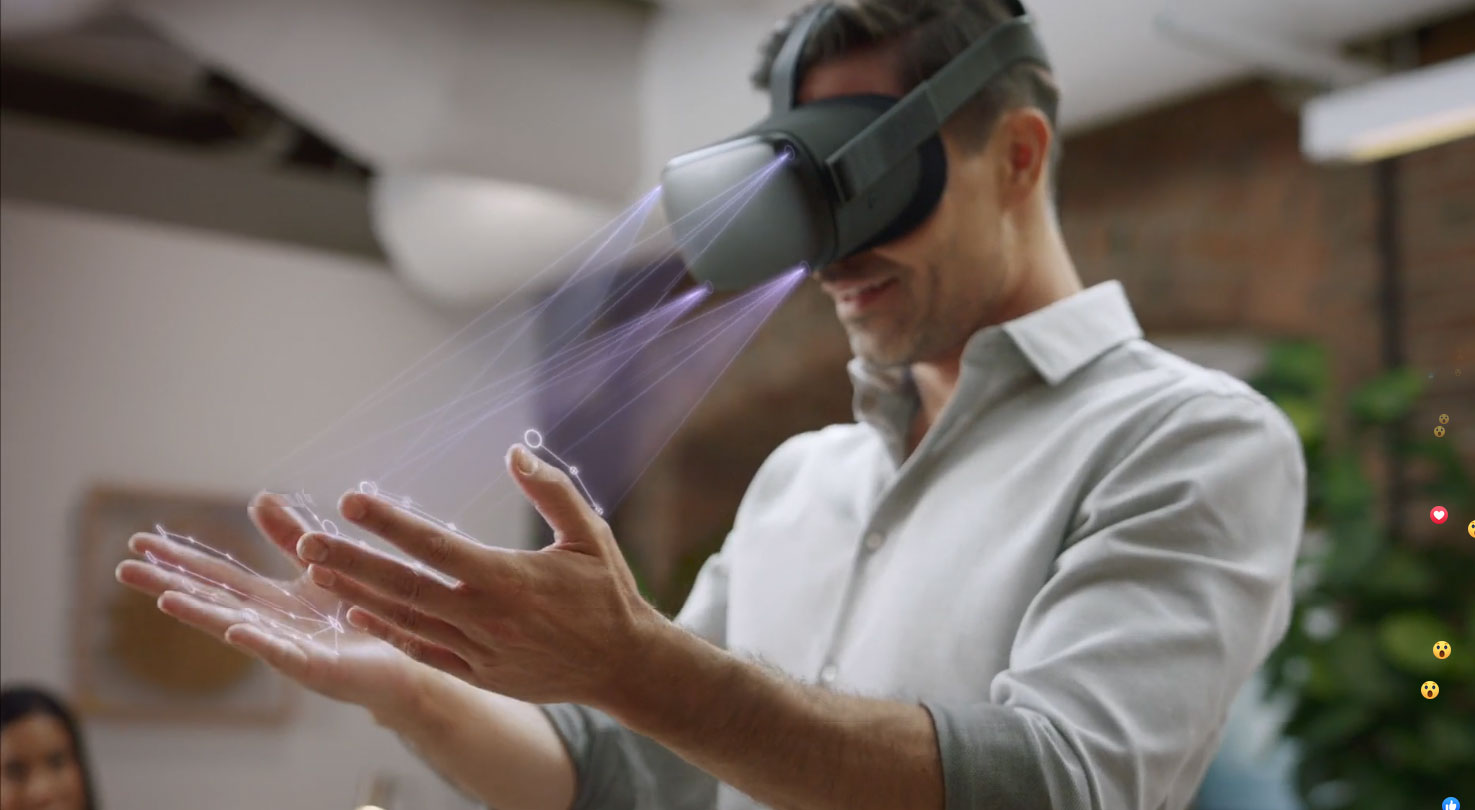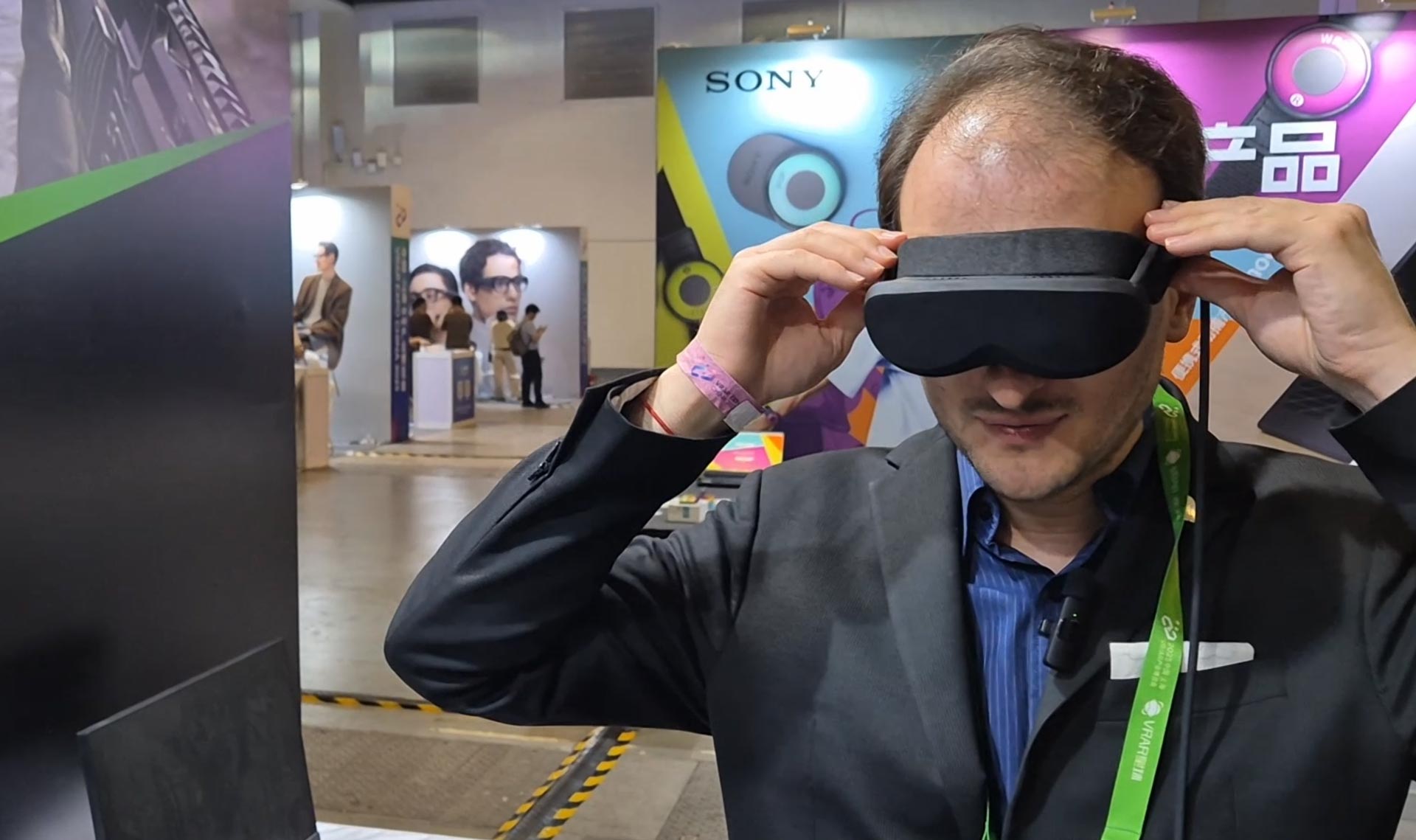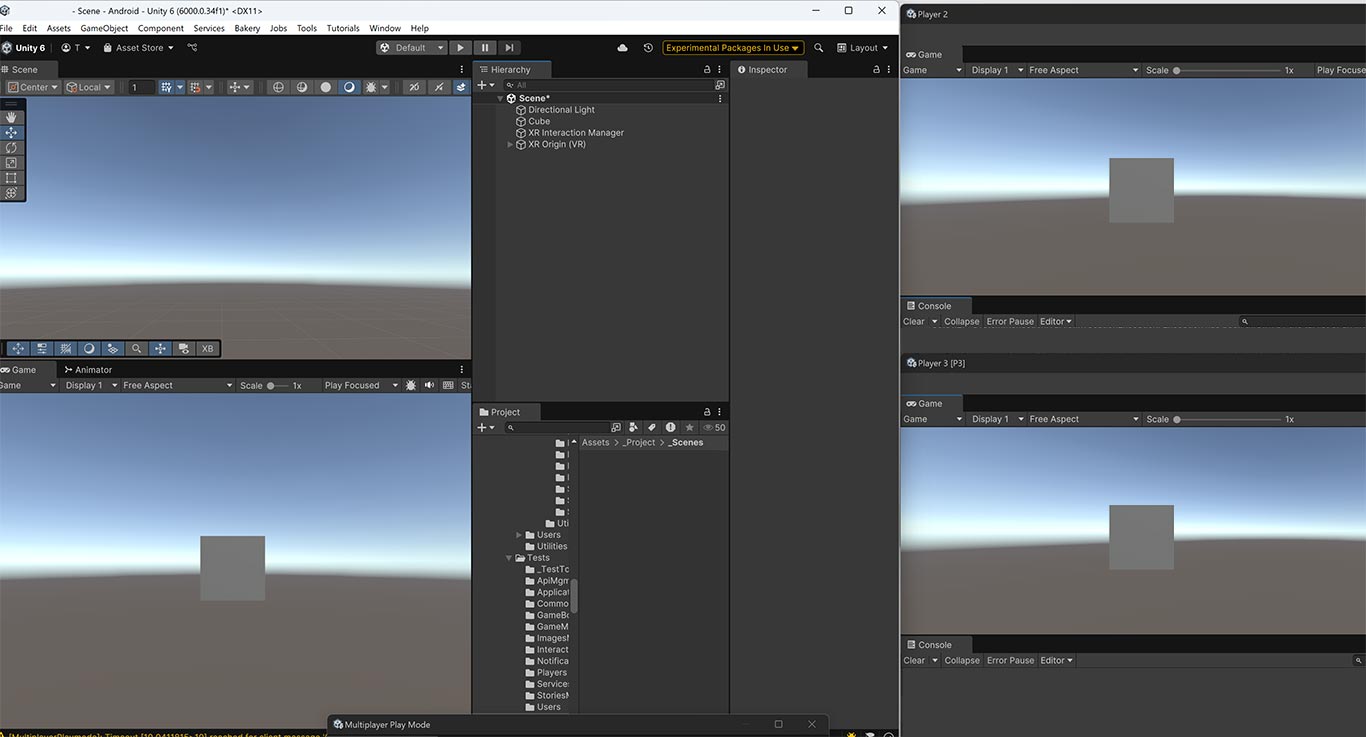The Ghost Howls’s VR Week Peek (2019.12.16): Oculus Quest gets hand tracking, Magic Leap pivots towards enterprise and much more!
I’m back from Belgium, where I took part in the nice Stereopsia event! Christmas is coming and it is that week of the year where I toast a lot with friends, coworkers, partners, etc… I hope you will have fun as well. And of course, between a glass of champagne and a slice of panettone, there is still time for VR, so here you are a collection of best VR news of the past week!
Top news of the week

Oculus Quest gets hand tracking
Last week, the runtime v12 of Oculus Quest has been rolled out, and this took with it lots of interesting updates. To start, now the Oculus Link is more stable and it is compatible with some AMD GPUs. Oculus Quests have started getting vocal commands in the menu. But, most importantly, now the Quest features hands tracking.
If you update the Quest until its latest runtime, you can now activate hands tracking in its experimental features. Doing that will disable the controllers, and you will be able to navigate in the menus just using your hands. Since the hands tracking SDK is being distributed today, no 3rd parties apps are currently compatible with the hands tracking interface, and you will be able to test it only in the various Oculus menus. Some developers have anyway already stated they plan to implement a controller-free interface in the next version of their applications.
I think that hand tracking can enable some interesting applications, and I want to test it to see how it works well and what kind of experiences become doable (also to evaluate if it can fit a boxing game like our HitMotion: Reloaded). I especially think it is great for exhibitions and demos since you don’t have to hand controllers to your users. First reviews say that it is good, but it has some issues: e.g. it can’t work if you have one hand occluding the other, or it has also problems with tattooed hands. Anyway, give me some time and I will give you my first impressions 😉
More info (Oculus Quest runtime v12 features)
More info (Oculus Quest hands tracking update)
More info (How to enable hands tracking on Quest)
More info (List of Quest apps supporting hands tracking)
More info (Hands tracking having issues with tattooed hands)
Other relevant news

Oculus social features now require Facebook login
What we all feared could happen when Facebook bought Oculus in 2014 is actually started to happen. With a modification of the Privacy Policy and some structural changes, now Oculus offers new amazing social features, but they require a Facebook login. Or better: now ALL social features of Oculus require that you log in via Facebook. I’m talking about: inviting people in your Oculus Home, having a text chat with an Oculus friend, create events, share what you’re doing in VR on Facebook, and so on. This is because Oculus uses Facebook’s infrastructure to offer them, and so you need a Facebook account to use it.
But while Oculus tries to keep some things separated (e.g. your Oculus friends can’t see your real name unless you allow that) and to offer also good things through this mechanism (e.g. knowing that whatever they do in VR, there is the real name associated with it, will make less people willing to troll online), this also has shady implications, like the fact that what you do in VR will be used by Facebook to provide you targeted ads when you use the social media.
Some people like John Carmack highlight that there is nothing bad about targeted ads, and personally, I agree: it’s better for me to see an ad about something that I’m interested into instead of one about vanilla-flavored dildos, but what scares me is that Facebook is actually collecting information about what I’m doing in VR, and merging it with the info it gets about me from my social account. Facebook has not done well in the past in guaranteeing user privacy and I’m afraid of what it can do with my data, especially when in the future there will be eye tracking, emotion tracking and such.
Facebook assures that no data about our rooms get sent to its servers and only data about what we do in VR is used… but as we have seen with this update, all they need is a change to the privacy policy to change all the conditions. Personally, I’m a bit scared. But at the same time, I knew this was going to happen… we all knew that. And the community is getting very worried.
More info (Facebook announcing new social features)
More info (Upload VR article on the topic — with Q&A)
More info (John Carmack talking about targeted ads)
More info (A redditor angry about this decision)
Magic Leap pivots towards enterprise
After the disappointing sales of the Magic Leap One, finally, Magic Leap has understood that the company can’t survive targeting consumers and “creators”, and it is time to target the only sector that is bringing money: the enterprise.
The Florida company is now offering a new package of its device, now dubbed just Magic Leap 1 (and not “Magic Leap One Creator Edition” anymore), with included dedicated warranty, assistance, and services targeted towards companies (e.g. fast replacement of a broken unit). The unit seems to have been slightly updated internally, but the company has not specified how. At the same time, Magic Leap has also shipped a new runtime for its hardware, with the addition of new nice features like vocal commands. The cost of the package is now $3000.
Honestly, I think that Magic Leap had to do this since the beginning: targeting consumers with such an experimental and expensive device was a suicide move, and in fact, the company is having more than one issue. Now the pivot comes too little, too late: Microsoft is years ahead of its competitors in offering services for big companies (Azure is a fantastic solution in this sense), and Magic Leap is really behind in this. I really don’t know how it could compete, unless it really cuts the cost of the device in half, maybe.
I hope for Magic Leap that the next device, Magic Leap 2, will be better. But it will come in 2021, and two years is a long time to survive. Anyway, I’m curious about the fact that they teased that in 2020 they will start distributing the foundation for the MagicVerse…
More info (Magic Leap pivots towards enterprise)
More info (Magic Leap new package and new services)
More info (Magic Leap voice control review)
More info (Tony Roger’s comment on the news)
Google ARCore now adds depth detection
Great news for all the augmented reality developers: the next version of Google ARCore is adding depth detection. This means that the system is able, using only the rear camera of the phone, to detect the exact depth at which the various objects in your environment are. This is amazing because it lets developers create AR applications that are more aware of their surroundings, and are so more realistic. For instance, you can add virtual elements that are occluded by the real elements, and that’s good for not breaking the immersion in the AR scene.
Interested developers can fill a form and get notified by Google when the feature will be available for testing.
More info (ARCore depth sensing)
More info (Example app developed with this solution)
JanusVR and High Fidelity close
That’s a very sad moment for social VR: last week, two important solutions like Janus VR and High Fidelity have shut down.
Janus is maybe the least known of the two. But if you are into VR for some years like me, you remember it for sure. It was maybe the first attempt in creating the Web 3.0: a VR browser where every website was actually a room, a 3D environment. The links were portals, the images were pictures on the walls and you could visit these 3D environments together with other people, that were represented by full-body avatars. Let’s be honest: Janus VR was mostly terrible, and the translation of the 2D web into 3D was not working very well (it was highly impractical). But it had an amazing vision, probably still years ahead of what we have now in VR, since it tried to envision the future of the web: 3D, social, interconnected. I will miss it so much.
High Fidelity, instead, was more famous and modern. It was the product of Philip Rosedale (one of the creators of Second Life), that wanted to offer a VR metaverse that was opensource, free, distributed and full of great values. The problem is that it never worked, and High Fidelity had very few users. The company at first tried various initiatives to improve the product, then it tried to pivot completely towards making a collaborative service for enterprise customers, and now it is closing all its activities. But Philip says that not everything is lost, and actually him team (now very little) is working on something new and innovative. Good luck to them.
One day we will live all in the metaverse. But that day is not today.
More info (JanusVR shuts down)
More info (High Fidelity shuts down)
More info (High Fidelity blog post about the future)
Boneworks launches successfully, but the critics don’t acclaim it
Stress Level Zero’s Boneworks, one of the most awaited VR games of the year, has finally been released on Steam. The Half-Life inspired shooter had created an amazing hype thanks to videos showcasing its fantastic interactions of the player with the environment around him, interactions that are physically realistic.
Thanks to this hype, at launch the game sold more than 200,000 copies and it has become the #1 selling game on the whole Steam. These numbers are insane, and are all beneficial for VR.
The problem is that I have found no review on a VR magazine that is completely positive about it: it is described as a game with amazing realistic interactions, that in some moments is really able to put you in awe. But the journalists say that it looks more like a cool sandbox than a complete game, and that in some moments these interactions are frustrating or highly uncomfortable. Road To VR even gave it a “6” mark. Keep this in mind if you think about buying it.
More info (Boneworks’s sales)
More info (Boneworks being #1 on Steam)
More info (Gameplay videos of Boneworks)
More info (Upload VR review)
More info (Road To VR review)
More info (Ars Technica review)
News worth a mention

Firefox and Chrome improve their XR offerings
Great news on the WebXR side:
- Firefox Realities is improving adding new features, including a cool one called “Send tabs”. You can now open a page on Firefox on your PC, and then select “send tab” and send it to Firefox Reality on your standalone headset. This is very handy and avoids you from writing a web address on the virtual keyboard of your VR headset;
- Chrome version 79 adds WebXR Device API support. With the WebXR Device API, developers can now create immersive experiences for smartphones and head-mounted displays in Chrome.
More info (Firefox Realities update)
More info (Google Chrome 79)
North ends production of Focals and focuses on Focals 2.0
North has stopped the production of the Focals glasses (one of the most trendy smartglasses on the market), to focus entirely on Focals 2.0 . It is great to hear that the company is working hard on the second iteration of the device (that should be far better than the first one), but this news also mean that the v1 wasn’t selling well at all, and this is not a piece of good news for the whole ecosystem.
Doc Ok is back with a great article on PSVR display
Oliver Kreylos, known in the VR communities as “Doc Ok”, is one of the smartest people when it comes down to talking about VR technology. After having been disappeared for a while, he has written a new article on his blog, talking about the actual FOV and resolution of the PSVR headset. It is also maybe the best explanation I’ve found on the web on what it is a pentile display and what are its pros and cons with regard to a full-stripe one. If you’re a bit a techie, this is a must-read.
More info (Doc Ok’s post)
More info (Doc Ok’s image on PSVR FOV)
More info (Interesting answer from Reddit to the post)
HBO is working on a TV Series about Snow Crash
Neal Stephenson’s Snow Crash is one of the most known cyberpunk novels about virtual reality, together with Ready Player One and a few others. It is news of this week that HBO is working on a TV series about it. We are all intrigued by the idea of watching it…
Beat Saber wins Game Of The Year award and adds lots of new features
What a week for Beat Saber! The rhythm game has just won the 2019 Game Of The Year award at The Games Award on December, 12th. Honestly I think that Asgard’s Wrath deserved to win, also because Beat Saber has been released in 2018, and only exited from early access in 2019, but anyway I understand that it is the most sold VR game of all times.
In the same period, it has finally released various 360-degrees levels for Oculus Quest and a new DLC with a music pack of songs by the Green Day! Beat Sabers fans will be happy.
More info (Beat Saber GOTY)
More info (Beat Saber new levels and features)
The full lineup for Sundance Festival has been revealed
If you are into storytelling, you will be happy to know that the full lineup for Sundance Festival has been revealed, and it includes many VR experiences.
Join VRX Webinar
My friends at VR Intelligence are hosting a webinar webinar on Wednesday, December 18 (8AM PT / 11AM ET / 4PM GMT) called “VR & AR/MR for Training & Education — What have we learned?”. The theme will be about how to use immersive technologies the right way to offer training and educational experiences.
Some info on XR content
Some info worth reading:
- I’ve found a review on Twin Peaks VR. It seems an experience a bit rough around the edges, good only for fans of the series;
- Budget Cuts 2 review: a nice VR game, a bit different from the first episode;
- Path Of The Warrior review: an interesting shoot-em-up game, that could have been better;
- Vacation Simulator gets released on Quest!
More info (Twin Peaks VR)
More info (Budget Cuts 2)
More info (Path Of The Warrior)
More info (Vacation Simulator)
Some XR fun
“Awww, I’m sure he’ll grow out of this electric helmet hobby and get a real job soon” is the sentence that all my family members say all time 🙂
Make me a Christmas gift!
Christmas is coming… and if you want to make a gift to your favorite VR blogger, consider donating to me on Patreon! 🙂
The family of my supporters is growing week after week, and now includes all these people:
- DeoVR
- Michael Bruce
- Ilias Kapouranis
- Paolo Leoncini
- Jennifer Granger
- Jason Moore
- Matias Nassi
- Francesco Strada
- Vooiage Technologies
- Caroline
Wish me a wonderful Christmas by clicking the link here below
Ho ho ho! Donate on Patreon to Skarredghost!
(Header image by Facebook)
Disclaimer: this blog contains advertisement and affiliate links to sustain itself. If you click on an affiliate link, I'll be very happy because I'll earn a small commission on your purchase. You can find my boring full disclosure here.



